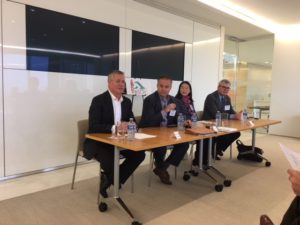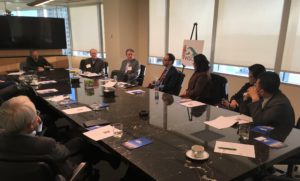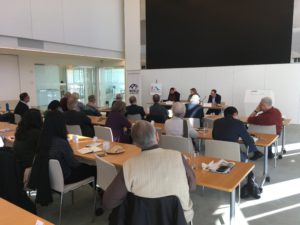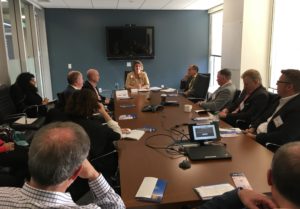On March 28, 2018, members and friends of the Washington State China Relations Council gathered for the 38th Annual Gala in Seattle. An outstanding line-up of speakers representing the many facets of US-China relations addressed approximately 270 audience members with insight and counsel, imparting a deeper understanding and appreciation for the remarkable history of US-China-Washington state relations since the inception of the WSCRC 39 years ago. The keynote conversation between Ambassador Gary Locke and Admiral Samuel Locklear explored fundamental questions on the balance of competition and cooperation between the US and China.
Port of Seattle Commissioner Ryan Calkins welcomed the audience, citing the chart-topping numbers of passengers travelling to and from China through the Port of Seattle and the huge volume of Washington goods being exported to China through Washington’s seaports. Calkins expressed optimism that the efforts of “strong leaders in congress and the business community will prevail against the current wave of protectionism. We look forward to continuing to work with the Council to fortify the state’s strategic position in the US-China dialogue.”
WSCRC chairman Andrew Wilson emphasized the importance of mutual benefit and reciprocity with the knowledge that “there are different opportunities and different needs” as we enter a new phase of US-Chinese competition and cooperation.
Yang Yihang, Economic and Commercial Counsellor of the People’s Republic of China Consulate General in San Francisco, shared Beijing’s perspective on US-China affairs. Notably, Mr. Yang underscored China’s intention to ease restrictions in sectors such as finance, telecom, medicine, and education in the coming year, which marks the 40th anniversary of China’s open market reforms. “The US and China share a very important and mutually beneficial economic relationship. We may have competition, but we don’t have to be rivals; instead, we should strive to be partners.”
Snohomish County executive Dave Somers elaborated on the significance of favorable relations with China at the local level. China is the county’s top export market for both aerospace and agriculture products, making it one of the nation’s most vulnerable regions to trade disruptions. Snohomish County has been collaborating closely with the WSCRC to enhance strategic engagement with China.
WSCRC co-founder and first president Bob Anderson was the honored recipient of the 2018 Sidney Rittenberg Award. Stan Barer, 2016 recipient of the award, described Mr. Anderson as, “the number one advocate in government of this state for trade,” while WSCRC president Mercy Kuo expressed that the “wisdom, vision and legacy of Bob Anderson deeply shapes the Council even to this day.”
Marianne Duong, head of public affairs for Starbucks across Asia, discussed the growth of the Starbucks n China, which serves over six million Chinese customers weekly and opens a new Starbucks store every 15 hours. Duong outlined how Starbucks is integrating the concept of “social gifting,” including care of employee families, stewardship of the next generation of leaders and elevation of coffee farmers and their coffee into the company’s comprehensive China strategy.
Bob Ormond of GX International discussed the brand’s massive investment project in Hangzhou, stressing GX’s commitment to the idea that “business will always find a way to succeed.”
Nelson Dong of Dorsey & Whitney introduced keynote speakers Admiral Samuel J. Locklear III and Ambassador Gary Locke, whose years of public service have spanned 39 and 32 years, respectively. Dong provided context for their remarks by citing statistics which illustrate the significance of the Indo-Pacific region to international security and well-being: “More than half of global GDP is produced in this region, one third of global shipping must traverse the South China Sea, more than one quarter of all US exports flow into this region. Half of the world’s population, as well as 11 of the world’s 15 largest militaries are in this region. These are the issues that keep admirals and ambassadors awake at night.”
Gary Locke opened with commentary on current policy discussions in Washington, D.C., and how they will ostensibly affect the nation, providing a counter-perspective on the efficacy of tariffs in accomplishing US economic objectives. Locke opined that recent developments such as harsh tariffs on steel and aluminum might make impressive headlines, but will almost certainly do more harm than good to the US economy.
Locklear shared seasoned perspectives on the US historical role in Asia as well as his outlook on key issues that will influence future relations. China’s controversial Belt and Road Initiative (BRI) for example, is a development that Locklear does “not view with concern or animosity,” pointing out that from China’s perspective, the BRI makes sense as it addresses many pent-up demands that need to be serviced. Rather than being intimidated, Locklear advised that US industry should view this as another form of competition in which they must compete. While it will be impossible that both sides always win in a competitive situation, Locklear emphasized the fact that there is absolutely no benefit for either the US or China to have a disagreement that would lead to military confrontation.
The implications for US-China relations of President Xi Jinping’s elevation within China’s government and the removal of term limits proved to be a key point of discussion. With a general attitude of, “wait and see,” Locklear noted that Xi has the huge task of grasping the complexities of governing a nation which is a result of an ‘economic miracle’ which is now maturing. Locklear sees Xi’s centralization of the military as a generally positive change that could help stabilize US-China leadership in Asia. Locke called attention to the collaboration and cooperation which have, contrary to common belief, characterized the military to military relationship between the two nations.
Locklear appreciated the frank dialogue that he witnessed at top levels of both militaries: “Realistically, you cannot have a relationship with someone you’re not talking to, and the last people you want not talking to each other are the people with the guns.” It will not be easy for China and the US to exist in the same sphere now that the two nations are at comparable levels of power and influence, but through sustained dialogue and compromise, Locklear believes that we will be able to effectively make headway on challenging issues in a way that avoids serious miscalculations that could result in military confrontation. In terms of the North Korean crisis, Locklear is hopeful that relations will improve through current negotiations.
Special thanks to WSCRC Platinum and Gold members and to emcee Marc Berger for a successful and enjoyable WSCRC 38th Annual Gala.



